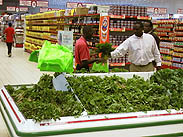A global nutritional crisis?
United Nations and Macdonald campus professors on food and biodiversity
Ironically, in a world where one of the biggest concerns in developing countries is how to get enough food, those same countries are suffering from an overabundance. Just as North Americans are succumbing to obesity, diabetes, cardiopulmonary disease — all ailments related to overeating — the urban affluent in developing countries are experiencing the same problems, while their rural counterparts go hungry.

Grocery store in Kenya
Timothy Johns
For the upcoming World Food Day October 16, the Montreal-based United Nations office of the Convention for Biological Diversity (CBD) teamed up with McGill to talk about the global issues surrounding food, nutrition and biodiversity in the symposium "Biodiversity, Food Security and the Nutrition Transition: Double Burden or Double Opportunity?" held at the Faculty Clubon October 13. CBD executive secretary Hamdallah Zedan was the keynote speaker.
Deborah Buszard, dean of the Faculty of Agricultural and Environmental Sciences, is delighted to have co-hosted the event with Nigel Roulet, McGill School of Environment director. McGill and the United Nations Environment Programme (UNEP), which the CBD is part of, are partners in global environmental education. Last March, the UNEP Network of Institutions for Sustainable Development (NISD) was inaugurated, and McGill (particularly Buszard's faculty) is a founding member — the only university member so far in the Americas. McGill's role is to strengthen long-term capacity building in sustainable development, environmental assessment and integrated assessment through promoting the advancement of knowledge by research and the training of graduate students in relevant disciplines.
Panel member Don Smith, professor of plant science, believes the key to feeding everyone will be to grow and manage a wide range of crops. But over time, the world's rich variety of local vegetation has been reduced because of our selective domestication of crops that have then edged out indigenous strains.
Cultivating our preferred plants is nothing new, however. "Even a thousand, two thousand years ago, we were dependent on wheat or, in the tropics, rice. But genetic manipulation's a bit short-sighted," Smith said in an interview. We have specialized in a smaller number of crops and crop genotypes, which has narrowed the range of nutrients available to eat, and also made the crops less hardy in the face of disease.
For example, the humble banana may not be around in a generation. Some countries have bred them down to a single genotype, so they're now vulnerable to infestation. Since bananas are clonal, which means they don't make seeds, their fate rests in the hands of human intervention.
Not only are there fewer crops than before, but our staple crops are becoming less nutritious. Smith said we've bred grains to be heavier and shorter, "but they're more packed with starch. The increase is in carbohydrates, not protein. We've kept up the caloric structure, but not the nutritional."
Timothy Johns, associate director of McGill's Centre for Indigenous Peoples' Nutrition and Environment, also participated. He said in an interview that four major sources of food energy are more available and cheaper than ever: wheat, rice, sugar and vegetable oil. Three carbs and a source of fat, basically. "You can take three of these ingredients and make something we all know and love: a doughnut," he said. As people turn away from traditional diets and toward street food and fast food, their health suffers.
"When people make choices based on economics, they choose what fills them up and costs less. You can eat more than enough for energy and be deficient in iron, zinc and vitamin A."
One way to counter the predilection for cheap, filling grub is to provide viable and better options that are culturally appropriate. For example, leafy vegetables are an essential part of the traditional diet in Kenya, where Johns does fieldwork. But when people move into the city, they don't have access to these greens, which they used to grow themselves. So even though the taste for them remains, consumption goes down.
There is hope, however, in the face of all these dire scenarios. Entrepreneurs started work with NGOs and local farmers to start supplying supermarkets in Nairobi with these greens in February 2003. The project took off, and the amount they now sell has increased tenfold. And they're still not meeting the demand.
In an interview, David Cooper, senior official for CBD, said that encouraging biodiversity has broad implications on health.
"By the mid-century, there will be half as many people again, but the food demand will double," Cooper said. "As people get richer, they eat more, and more meat. For instance, in feeding corn to cattle, you need a lot more calories of grain to get one calorie of meat. And to produce the meat, you need to use more nitrogen fertilizers and pesticides. This excessive nitrogen use leads to pollution, increased acid rain and oxygen-depleted 'dead zones' like in the Gulf of Mexico."
For solutions, CBD looks at three areas: biodiversity in crops, biodiversity in food production — it's important to encourage a merry range of bugs and other pollinators — and the impact of what we eat on biodiversity.
One big change in diet is the increase in use of palm oils. Expansion of palm crops are a major cause of deforestation, Cooper explained. Also, by eating more meat, the total input of nitrogen into the environment increases. "The [meat-heavy] North American diet uses three times the amount of nitrogen-based fertilizer than the Mediterranean diet," he said. "We'd like to make the link between human health and the environment. Eating too much meat is bad for both."
Cooper said that at the most recent policy-making meeting of the CBD members, they started an initiative that would bring together their work with that of the Food and Agriculture Organization (FAO) and the World Health Organization. This year FAO declared World Food Day to be devoted to biodiversity.
